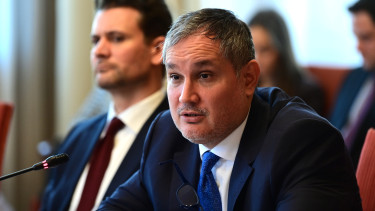Doctors about to make a call that will decide the future of Hungary's health care

Unprecedented wage hike comes at a cost
Hungary's Prime Minister Viktor Orbán has announced over the weekend that the cabinet would raise wages for doctors, a historic move that was coerced by the coronavirus pandemic. The happy cheers have died down and tears of joy turned into just tears on Monday, as the cabinet presented a "surprise" for health care workers.
A bill submitted to Parliament seeks to raise doctors' wages and phase out gratutity payments, but it also regulates doctors' new legal status in much greater depth than previously thought. The President of the Hungarian Medical Chamber (MOK) said they were given a couple of hours to review the proposals and share their views with policy makers. By Tuesday noon it was a done deal. In less than two days, MPs (with a legislative majority held by Prime Minister Viktor Orbán's Fidesz party and its minor ally KDNP) adopted the bill after adjusting it by a few recommendations made by MOK.

UPDATE: MOK has issued a statement on Wednesday afternoon, criticising the rushed adoption and content of the bill.
In essence, the new regulation creates a health care service status for doctors and residents working in the public health system, and the strict conditions of this is the price to pay for the unprecedented wage hike. So, what are these conditions then?
- Doctors working at public institutions are banned from engaging in any other gainful occupation, contract with private health service providers, or as self-employed issue invoices to other institutions. (In practice, this will require authorisation but the conditions they would have to fulfil or what authority will be in charge of this process are unknown at this point.)
- Doctors cannot have more than one job, unless their employer is the same.
- Doctors would be banned from treating the same patient simultanously in a public institution and outside of it. The rationale of the bill has already mentioned some exceptions to this rule (e.g. gynaecologists).
- They would eliminate the possibility of a doctor using public health care capacities to provide private health services.
- Wage freeze for a year: those who exit the health service legal relationship would not be able to earn more even in the new position.
- Doctors may be reassigned to other institutions for a specific duration (1+1 year), or even for an unspecified duration if the two institutions in question are managed by the same operator and if the employer cannot perform its public duty, e.g. it cannot grant leave.
- Gratuity payments will become punishable by law, i.e. another major source of income for doctors will be gone (although a large part of what is paid under the table such ends up at a relatively small group of physicians).
The repercussions
The aforementioned conditions hurl a huge boulder into the placid lake of Hungary's health care system that has not seen many ripples over the last few decades. We can expect the following to key consequences.
- Doctors are faced with a tough choice: they will have to decide between a private practice and public health care. This choice will determine the quality of both areas and the services they will offer. More bluntly: the choices doctors will make will determine the conditions for therapeutic recovery for patients.
- When doctors' legal status is linked to certain conditions the structure of health care will also start to be revamped along in the slipstream. If a physician is banned from having a second job (or if it requires prior authorisation) it will be impossible to maintain on-call procedures or operate some departments in smaller hospitals in the country, as these are probably the institutions doctors currently work at in contractual relations.
Doctors' choice
Those affected by the new regulation will have quite a burden to carry over the next weeks and months. This is not an easy call to make, not at all. Doctors are likely to consider the following factors:
- It's not only about earnings, but also the working conditions and the time one has outside work, and the latter two have been becoming ever more imporant.
- Wages in the public health care system will go up. The question is how the capacities and the work load will change as a result. This hinges on how many doctors will opt for the new state contract.
- No more multiple income sources inside the public system.
- Incomes are expected to go up also in private health care.
- The current conditions in various public health care institutions are also to be considered, along with organisational issues and how transparent and predictable these are for the doctors.
- In the private sector, there's no on-call duty, no one will reassign you to a different institution that may be even in a different city (either for a fixed or for an unspecified period), there's no wage freeze if you change your employer, while these are your options in the public system.
- Being a doctor in public health care continues to send a message of prestige. A lot of doctors believe it is where real professionalism resides and they would not give this up easily (a wide array of cases, complex treatment opportunities, etc.).
- Private health care can be better equipped in terms of technologies and instruments.
- Doctors' decisions could also depend on how much they have been relying on gratuities.
- The specifications of the doctors (whether they are in in-patient care or out-patient care) and the years they have spent practicing are also factors to consider.
It is also possible that a majority of those affected will not be able to make up their mind before the deadline. They could take up a wait-and-see stance and stay in the public system for now because they don't want to lose their status. First they may want to test the waters, see how it goes and whether fundamental changes are made to the system, if their work load starts to mount or if organisation issues arise, and only then they will revisit the subject and possibly reconsider their original choice.
The government's move tips a wrong balance in the health care system that was based on extremely low wages, excessive extra work, gratuities, working in several jobs and the use of public facilities for private medical services.
the time is now to establish a new equilibrium that will hopefully entail an improvement in the performance of the public health care system.
The profession has a historic opportunity here and not only because of the unprecedented wage hike but also because of the choice doctors were given. It is a responsibility of major proportions.
Cover photo: MTI/Márton Mónus








